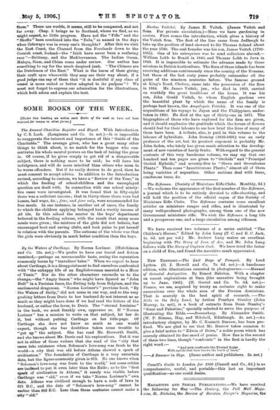By the Waters of Carthage. By Norma Lorimer. (Hutchinson and
Co. 12s. net.)—We prefer to have our travel and fiction unmixed,—perhaps an unreasonable taste, seeing the reputation commonly borne by "travellers' tales." When we expect to hear about Carthage, it is a disappointment to find ourselves confronted with " the unhappy life of an Englishwoman married to a Moor of Tunis." Nor do the other characters reconcile us to the change,—the "Angry Saxon" who might have figured as "John Bull" in a Parisian farce, the flirting lady from Belgium, and the sentimental dragoman. "Norma Lorimer's " previous book, "By the Waters of Sicily," did not come in our way, and so the very gushing letters from Doris to her husband do not interest us as much as they might have done if we had read the letters of the husband, or rather the lover, to Doris. The "eternal feminine" in the book, we must frankly own, oppresses us. If "Norma Lorimer" has a mission to write on that subject, let her do it, but without putting Carthage on her title-page. Of Carthage she does not know as much as one would expect, though she has doubtless taken some trouble to "get up" the subject. She has read Mr. Bosworth Smith, and she knows about Mr. Davis and his explorations. But it was not in either of these writers that she read of the "city that came into existence when Solomon's love-song was fresh to the world—a city that was old before Athens showed a spark of civilization." The foundation of Carthage is a very uncertain date, but the figure commonly given is 878. No one knows when "Solomon's love-song was fresh to the world," but some critics are inclined to put it even later than the Exile; as to the "first spark of civilization in Athens," it surely VMS visible before Carthage was "old," even if we take "Norma Lorimer's " own date. Athens was civilised enough to have a code of laws in 621 B.C., and the date of "Solomon's love-song" cannot be earlier than 902 B.C.. Less than three centuries cannot make a -eity- " old."








































 Previous page
Previous page